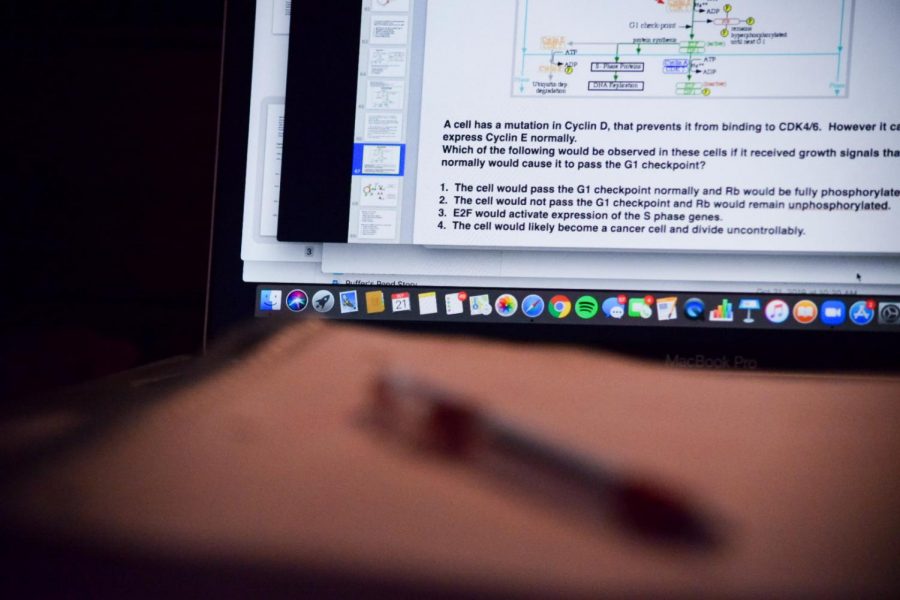In the new age of remote learning, many students have acquired new tools and gadgets to improve their learning process in the now, almost completely, digital world. One tool that I have found to be extremely helpful is the use of blue light glasses.
Blue light is unavoidable today. It is everywhere, from our phones, televisions and laptops to fluorescent or LED lighting. The only source of blue light used to be the sun itself, but now with an increase in using more sustainable blue lights in our homes and businesses, many people are discovering the adverse effects of too much exposure to blue light. Blue light itself is not harmful to the eyes, but it can disrupt sleeping patterns drastically by changing the circadian rhythm of the body. Too much exposure to blue light and its negative effect on sleeping patterns may even contribute to the cause of cancer, diabetes, heart disease and obesity. Blue light suppresses the secretion of melatonin, the hormone that regulates the circadian rhythm, more heavily than other kinds of light. In a study by the University of Toronto, researchers tested the melatonin levels of two different groups of people exposed to bright light. One group was wearing blue light blocking glasses while the other was not. Researchers found that due to similar levels of melatonin in both groups, blue light greatly affects melatonin levels and makes it difficult to fall asleep at night.
Even before the COVID-19 pandemic brought in-person learning to a halt, I found that I was experiencing a large increase in headaches, eye strain and fatigue from spending so much time on my computer. Like most college students, my laptop is my biggest tool for learning. I would spend hours writing papers or staring at the screen as I did my homework. Even when I chose to relax after classes and homework, I often opted to watch a movie or TV on my laptop, or browse social media on my phone. So much screen time, and an increased amount of blue light, was causing me to have bad headaches and difficulty sleeping at night. Now, with remote learning becoming almost universal, most students are spending even more time in front of a screen. Some students even use iPads or other types of tablets to take notes instead of paper, which is just another source of blue light.
One way that many people, including myself, are helping to combat the intake of blue light is by using blue light glasses. These glasses are relatively inexpensive and can greatly improve the adverse effects of too much screen time. The non-prescription blue light glasses I wear are only about 20 dollars on Amazon. I have found that my headaches have greatly reduced, and my eyes do not feel strained, even after a long day spent watching Zoom lectures and doing homework on my computer. While blue light glasses have not been approved as an effective medical cure for improving the side effects of screen time, they have been proven to improve sleeping quality.
Most medical professionals simply advise that technology users suffering from headaches or eye fatigue should try to decrease their screen time, especially later in the night. For most college students, cutting down on screen time is simply not an option. With classes held virtually throughout the day and most homework found on online platforms as well, it is very difficult, if not impossible, to decrease screen time. Many students do not even have access to a printer to avoid staring at a screen as they do their assignments, and most textbooks are digital as well. College students also do not always have the option to simply shut down their screens as it gets close to bedtime. Hard deadlines and due dates, as well as exam studying, can often lead students to stay awake into the late hours of the night, especially if students have classes, extra curriculars or work throughout the day.
Although the true medical impact of blue light glasses may not be completely proven yet, many people, including myself, have found drastic improvements in side effects from too much screen time by using this inexpensive fix. Even if the glasses are simply a placebo, I still have had a large reduction in headaches and have been able to sleep better at night. In general, everyone should try to reduce screen time as much as possible, but in a remote and digital world, blue light glasses are the best way to combat the unavoidable intake of blue light.
Alanna Joachim is a Collegian columnist and can be reached at [email protected].




















John Shane • Oct 23, 2020 at 11:18 pm
Just adjust the screen color balance. Windows has a night mode that reduces blue light. Android has a blue light reduction setting too. I don’t know if iOS does but it should. There should be no need for glasses.